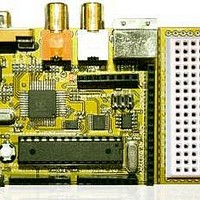Chameleon-AVR Nurve Networks, Chameleon-AVR Datasheet - Page 50

Chameleon-AVR
Manufacturer Part Number
Chameleon-AVR
Description
MCU, MPU & DSP Development Tools AVR8 & PROPELLER DEV SYSTEM (SBC)
Manufacturer
Nurve Networks
Datasheet
1.CHAMELEON-AVR.pdf
(268 pages)
Specifications of Chameleon-AVR
Processor To Be Evaluated
AVR 328P
Data Bus Width
8 bit
Interface Type
USB, VGA, PS/2, I2C, ISP, SPI
Operating Supply Voltage
3.3 V, 5 V
Lead Free Status / RoHS Status
Lead free / RoHS Compliant
- Current page: 50 of 268
- Download datasheet (17Mb)
© 2009 NURVE NETWORKS LLC “Exploring the Chameleon AVR 8-Bit”
Figure 11.7 – NTSC “Super Frame” video signal reference for NTSC frame construction.
11.2.5.1 Frame Construction
Referring to Figure 11.7. This diagram represents the NTSC color “Super Frame”. The complete NTSC spec actually has
4 fields per super frame (if you want to follow the spec and interlace 100%). We aren’t going to follow the spec 100%, but
we are going to follow some of the more important parts of the spec, one such area is in the “vertical sync” and
“equalization pulses” area, please concentrate your attention on this area of Figure 2.20, for the description below.
A Frame is composed of 262.5 lines (non-interlaced), 262 will suffice. Of those 262 lines, many of them are invisible due
to overscan, and some must be used for the vertical retrace pulse. Therefore, a first attempt to generate a video signal
frame is the following algorithm:
If you add up the lines, you will get a total of 262 lines including active, inactive, and retrace or vertical sync. Now, due to
overscan, you probably won’t be able to see more than 200-220 of the active scan video lines, they will typically be
beyond view. Thus, most games systems don’t waste draw them, and simple increase the overscan regions. So a good
rule of thumb is that active video should be from 192-224 lines with equal amount of top and bottom overscan.
50
Related parts for Chameleon-AVR
Image
Part Number
Description
Manufacturer
Datasheet
Request
R

Part Number:
Description:
MCU, MPU & DSP Development Tools PIC24 & PROPELLER DEV SYSTEM (SBC)
Manufacturer:
Nurve Networks
Datasheet:

Part Number:
Description:
MCU, MPU & DSP Development Tools AVR8 VIDEO GAME DEV SYSTEM (SBC)
Manufacturer:
Nurve Networks

Part Number:
Description:
MCU, MPU & DSP Development Tools PIC24 VIDEO GAME DEV SYSTEM (SBC)
Manufacturer:
Nurve Networks










